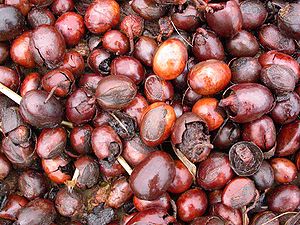 Image via WikipediaAs I move forward past menopause into my fifties, I must say that every morning, I feel more aches and pains. I'm an athlete, so I know over doing it is part of the problem. I also know that I'm not alone since many of my friends male and female alike complain of the same issue.
Image via WikipediaAs I move forward past menopause into my fifties, I must say that every morning, I feel more aches and pains. I'm an athlete, so I know over doing it is part of the problem. I also know that I'm not alone since many of my friends male and female alike complain of the same issue.I've done some research on new things being researched to help with joint health for menopausal women and andropausal men.
Pine bark extracts
Several studies also report the potential of extracts from French maritime pine bark to reduce inflammation and pain associated with osteoarthritis. German researchers first reported such effects in 2006 using the branded Pycnogenol ingredient. The researchers looked at inhibition of the cyclooxygenase, COX-1 and COX-2 – enzymes that are well known to be responsible for inflammation and pain – and reported statistically significantly inhibition of both enzymes. (Biomedicine and Pharmacotherapy, Vol. 60, pp. 5-9).
Two years later, Italian researchers reported in Phytotherapy Research (Vol. 22,pp. 518-523) that supplements of the pine bark extract may reduce the pain associated with arthritis of the knee by about 55 per cent. The study was a randomised, double-blind, placebo-controlled trial involving 156 patients with osteoarthritis and also indicated an improvement in all osteoarthritis symptoms by 56 per cent.
From trees to eggs to seaweed
With the joint health market growing it is no wonder that alternatives to the glucosamine/chondroitin combinations are emerging. At the tail-end of last year, Australian scientists reported that an extract from the shea tree (Vitellaria paradoxa) may exert anti-inflammatory effects and reduce markers of osteoarthritis. The ingredient, called SheaFlex 70, was tested by researchers at the Australian Centre for Complementary Medicine Education and Research in Brisbane. The study was funded by BSP Pharma, the holder of the worldwide rights for the ingredient, and the findings were published in Phytotherapy Research.
Another emerging ingredient is an extract from the membrane of an eggshell. According to findings from a randomised, multicenter, double-blind, placebo-controlled trial, a daily dose of 500 milligrams was found to not only reduce joint pain, but also stiffness, with effects noted after only ten days. The study, which was funded by Missouri-based ESM Technologies and uses the company’s ingredient, was published in Clinical Rheumatology.
Irish company Marigot have also been investing in supporting the potential joint health benefits of its red seaweed ingredient. A trial published in the open access Nutrition Journal found that the natural, multi-mineral ingredient derived from the red seaweed Lithothamnion Corallioides may allow osteoarthritis sufferers to reduce their use of NSAIDs by 50 per cent.
Daily doses of Marigot’s Aquamin ingredient allowed patients with osteoarthritis of the knee to partially withdraw their use of non-steroidal anti-inflammatory drugs (NSAIDs), while also producing improvements in the range of motion of the knee, and during walking exercises, stated the article.
Others are also looking at seaweed extracts and Australian researchers recently reported that a blend of three seaweed extracts could improve measures of pain, stiffness, difficulty with physical activity and overall symptom severity were recorded following 12 weeks of supplementation (Biologics: Targets & Therapy, 2010, Vol. 4, pp. 33-44). The study used Marinova’s Maritech branded ingredient, and is composed of extract of Fucus vesiculosis (85 per cent), Macrocystis pyrifera (10 per cent) and Laminaria japonica (5 per cent) plus vitamin B6, zinc and manganese. Marinova funded the research.

No comments:
Post a Comment